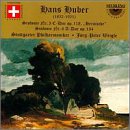| All Artists: Hans [Composer] Huber, Jorg-Peter Weigle, Stockholm Philharmonic Orchestra, Stuttgart Philharmonic Orchestra, Stephan Leuthold, Barbara Baier Title: Hans Huber: Symphony No. 3; Symphony No. 6 Members Wishing: 1 Total Copies: 0 Label: Sterling [Qualiton] Original Release Date: 1/1/2000 Re-Release Date: 3/1/2000 Album Type: Import Genre: Classical Style: Symphonies Number of Discs: 1 SwapaCD Credits: 1 UPCs: 675754130121, 7393338103721 |
Search - Hans [Composer] Huber, Jorg-Peter Weigle, Stockholm Philharmonic Orchestra :: Hans Huber: Symphony No. 3; Symphony No. 6
 | Hans [Composer] Huber, Jorg-Peter Weigle, Stockholm Philharmonic Orchestra Hans Huber: Symphony No. 3; Symphony No. 6 Genre: Classical
|
Larger Image |
CD Details |
CD ReviewsEnterprising and Daring Charles Voogd | Underwaterland | 11/13/2000 (4 out of 5 stars) "Are you looking for solidly crafted Symphonies with a touch of Brahms, some Raff and Schumann and some of his own. Listen to these!I suggest you start with Symphony #2 (also on Sterling) because the three works on that disc give the best memorable tunes. After that, take #3 and #6, and after that go to #5. All in all you'll have a good overview of this Swiss composer who thought in big broad canvases.Never the music gets modern (try to imagine that at the same time Mahler, Berg, Schoenberg and Webern were doing the modern things) or daring. But it is all expertly done (but sometimes too long).The recording is not very good, recessed at times (unbelievable in these modern times, many recordings from the sixties sound more open and dynamic) and violins scratchy whem playing unisono.The playing of this German orchestra is fine, only when finesse has to be given, ensemble-playing tends to be out of time and lazy. Please, take a little bit more rehearsel-time with the next recordings of this Wilhelm Tell." Hans Huber, Late Romantic Thomas F. Bertonneau | Oswego, NY United States | 01/10/2001 (4 out of 5 stars) "The producers at Sterling, a Swedish label, have dedicated themselves to the cause of the fin-de-siècle Romantics, but they have not duplicated the efforts of other companies with a similar policy - with Marco Polo, for example. Rather, they have found unexploited musical lodes. Sterling issue their discs in series and the disc containing the two symphonies, nos. 3 (1902) and 6 (1911) by Hans Huber (1852-1921) come under the rubric of "Swiss Romantics." In trying to convey the gist of a more or less unknown composer, we inevitably make use of analogy. I'd say, then, that Huber resembles a more technically advanced Raff, absorbing the presence of Wagner and Strauss in the way that Raff absorbed the presence of Schumann and Liszt. Yet Huber impresses immediately as a somewhat more serious composer than Raff, sterner in countenance, bolder in statement. The Third Symphony in C-Major carries the title "The Heroic" and justifies the appellation by both its scale and content. It lasts nearly three quarters of an hour and involves both an organ and a soprano solo. (She sings the "Sanctus" at the climax of the Finale.) The First Movement (Adagio Molto), at thirteen minutes, lasts longer than any of the other three; its main subject takes on a variety of guises, in particular that of a sombre, horn-dominated chorale. Huber calls the Second Movement "Funeral March," with obvious allusion to the corresponding movement of the "Eroica." The Third Movement, a grim scherzo with the designation of a "Totentanz," comprises a set of variations on the medieval "Dies Irae," quite effective in its way, with many surprises - including references by quotation to other composers whom Death apparently carries off! The Fourth Movement (Allegro con Fuoco) brings in the organ but ends more quietly than it begins, with the "Sanctus." The Sixth Symphony in A Major comes from ten years later and exhibits a sunnier disposition than Symphony No. 2. Here, Huber is reminiscent indeed of Raff, by which I mean to demote neither Huber nor Raff. Apparently Sterling issues one or two other discs of Huber's symphonies, which I will try to explore based on my positive reaction in the present case. It's hard to evaluate the performance, since this repertory is not represented elsewhere in the catalogues. The Stuttgart Philharmonic under Jorg-Peter Weigle seems to make a good case for the two scores. Recommended."
|

 Track Listings (8) - Disc #1
Track Listings (8) - Disc #1